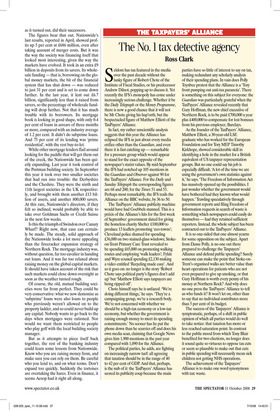The No. 1 tax detective agency
Ross Clark
Seldom has tax featured in the media over the past decade without the lanky figure of Robert Chote of the Institute of Fiscal Studies, or his predecessor Andrew Dilnot, popping up to discuss it. Yet recently the IFS’s monopoly has come under increasingly serious challenge. Whether it be the Daily Telegraph or the Money Programme, there is now a good chance that it will not be Mr Chote giving his hap’orth, but the bespectacled figure of Matthew Elliott of the TaxPayers’ Alliance.
In fact, my rather unscientific analysis suggests that this year the Alliance has eclipsed the IFS in just about every media orifice other than the Guardian, and even there it is fast catching up — remarkable for a pressure group which would appear to stand for the exact opposite of the newspaper’s statist values. By mid-September the IFS had notched up 105 mentions in the Guardian and Observer against 90 for the TaxPayers’ Alliance. For the Daily and Sunday Telegraph the corresponding figures are 68 and 200; for the Times 51 and 55. Perhaps most remarkably, the IFS trails the Alliance on the BBC website, by 36 to 50.
The TaxPayers’ Alliance publicity machine would have had Goebbels stunned. This is a précis of the Alliance’s hits for the first week of September: government slated for giving the homeless charity Shelter £100,000 to produce 13 leaflets promoting ‘eco-towns’; Cleveland police shamed for spending £36,000 on two stained-glass windows; Stokeon-Trent Primary Care Trust revealed to be spending £65,000 on promoting walking routes and employing ‘walk leaders’; Fylde and Wyre council spending £2,130 making a video entitled ‘Recycling made easy’. And so it goes on: no longer is the story ‘Robert Chote says political party’s figures don’t add up’ but ‘Matthew Elliott says taxpayers are being ripped off’.
Chote himself says he is unfazed. ‘We’re doing different things,’ he says. ‘They’re a campaigning group, we’re a research body. We’re not concerned with whether we should be a high-tax economy or a low-tax economy, but whether the government is raising enough money to meet its spending commitments.’ No sooner has he put the phone down than he scurries off and does his own media scan, claiming that Google News gives him 1,900 mentions in the past year compared with 1,090 for the Alliance.
The political parties, he adds, are fighting on increasingly narrow turf: all agreeing that taxation should be in the range of 40 to 42 per cent of GDP. And that, perhaps, is the nub of it: the TaxPayers’ Alliance has scored its publicity coup because the main parties have so little of interest to say on tax, making redundant any scholarly analysis of their spending plans. In vain does Polly Toynbee protest that the Alliance is a ‘Tory front pumping out anti-tax paranoia’. There is something on this subject for everyone: the Guardian was particularly grateful when the TaxPayers’ Alliance revealed recently that Gary Hoffman, the new chief executive of Northern Rock, is to be paid £700,000 a year plus £400,000 to compensate for lost bonuses from his previous employer, Barclays.
As the founder of the TaxPayers’ Alliance, Matthew Elliott, a 30-year-old LSE graduate who has worked for the European Foundation and for Tory MEP Timothy Kirkhope, showed considerable skill in identifying a hole in the market for a British equivalent of US taxpayer representation groups. But no one could say his job is especially difficult. ‘A lot of the time we are using the government’s own statistics against it,’ he says. ‘The Freedom of Information Act has massively opened up the possibilities. I just wonder whether the government would have bothered had they known what would happen.’ Trawling speculatively through government reports and filing Freedom of Information requests in search of waste is something which newspapers could easily do themselves — had they retained sufficient reporters. Instead, the whole subject has been contracted out to the TaxPayers’ Alliance.
It is so one-sided that one almost yearns for some opposition on the subject. Apart from Dame Polly, is no one out there prepared to challenge the Taxpayers’ Alliance and defend public spending? Surely someone can make the point that Stoke-onTrent’s organised walks are better value than heart operations for patients who are not even prepared to give up smoking, or that Gary Hoffman is worth every penny of his money at Northern Rock? And why does no one press the TaxPayers’ Alliance to tell us who funds it? It won’t let on, other than to say that no individual contributes more than 5 per cent of its budget.
The success of the Taxpayers’ Alliance is symptomatic, perhaps, of a shift in public opinion of which all parties would do well to take notice: that taxation has more or less reached saturation point. In contrast to the public mood from which Tony Blair benefited for two elections, no longer does it sound quite so virtuous to oppose tax cuts or seem so plausible to make out that cuts in public spending will necessarily mean sick children not getting NHS operations.
The achievement of the Taxpayers’ Alliance is to make one word synonymous with tax: waste.










































































 Previous page
Previous page